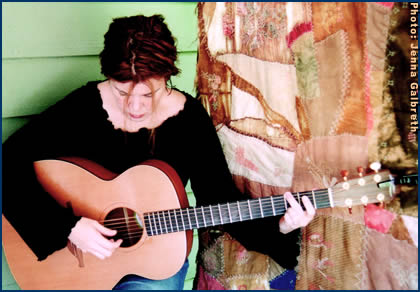
STILLHOUSE ROAD [Compadre] • Julie Lee
Julie Lee's first studio recording, Stillhouse Road, is, to my mind, about love. Before you skip to the next review, let me quickly say that far from being the usual tired repeat of that oft-done subject, Lee explores love in its many colorful guises. Love of home, self-love, love of God, love of food--they’re all here and more besides. Among the elements that keep this record free of sentimentality are Lee's unerring instinct for the cogent phrase, her beautiful and unusual melodies, and genuine delivery.
On her website, Julie Lee says she thinks of the album as a quilt--a tapestry, I guess, of styles and influences. It's true that in the good, old, new-folk way, Lee slides across genres, starting out with the bluegrass feel of her title track and dipping into blues, folk, and old jazz inspirations along the way. Her own voice and vision come through, though, authentic and clear, whatever the genre, avoiding the Frankenstein feel of albums that try to be too many things to too many people. Her ability to lyrically cut through to the heart of an idea or a person keeps Stillhouse honest. In what, for me, became the central image of this album, "Many Waters" takes the subject of love head on: "Many waters cannot quench it / Many waters cannot drown it / When it’s true..." Nostalgia emerges dusty and heartbroken from the prohibition days of the title track: "If only they knew / All it cost you / Back on the stillhouse road." The mood and feel shift often, from upbeat and toe-tapping to plaintive and lilting. This, combined with the fact that Lee frequently doesn't resort to conventional rhymes, keeps things compelling and surprising to the very end.
Lee's voice manages to be at once sweet and powerful, with a pleasing waver in it that can make it sound at times appropriately old-fashioned. With guests Vince Gill and Alison Krauss on harmonies, there were moments the vocals literally made me hold my breath. Lee says that she isn't afraid to let the seams show in her music: the thing is, when you've got some of Nashville's Finest playing and singing with you (Rob Ickes, Pat McInerney, Tammy Rodgers, Dave Pomeroy, as well as Krauss and Gill, to name a few), the music can seem, well, seamless.
The production on Stillhouse Road is mostly spot-on, letting Lee's writing and voice do most of the talking. There's lots of good space sonically, as well as breathing room in the phrasing, giving the songs plenty of time to sink in like a gentle rain. The only times I became uncomfortably conscious of the production were in rare moments of harmony effects overkill that didn't seem to match the generally comfy feel of the album.
Stillhouse
does visit the shadier sides of the human soul, as in "Soapbox,"
an expose of the motives of a soapbox preacher, or in "James,"
a visit to the heart of Cain. Darker moments notwithstanding, it's a relief
to hear an album that's sweet but not cloying, sheds an unclouded light,
and is warm and colorful as the old quilt Julie Lee envisions Stillhouse
Road to be. It's one you'll want to wrap up in when it gets a little
cold out there.
•
Judith Edelman
listen to clips return to covers buy it here
julielee.org compadrerecords.com
puremusic home